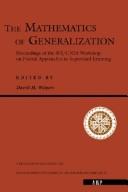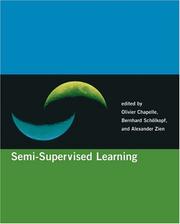| Listing 1 - 10 of 31 | << page >> |
Sort by
|
Book
ISBN: 0429297599 1000176819 Year: 2021 Publisher: Boca Raton, Florida ; London ; New York : CRC Press,
Abstract | Keywords | Export | Availability | Bookmark
 Loading...
Loading...Choose an application
- Reference Manager
- EndNote
- RefWorks (Direct export to RefWorks)
AI framework intended to solve a problem of bias-variance tradeoff for supervised learning methods in real-life applications. It comprises of bootstrapping to create multiple training and testing data sets, design and analysis of statistical experiments and optimal hyper-parameters for ML methods.
Book
ISBN: 3031175875 3031175867 Year: 2022 Publisher: Cham, Switzerland : Springer,
Abstract | Keywords | Export | Availability | Bookmark
 Loading...
Loading...Choose an application
- Reference Manager
- EndNote
- RefWorks (Direct export to RefWorks)

ISBN: 0201409836 Year: 1995 Publisher: Reading (Mass.) : Addison-Wesley,
Abstract | Keywords | Export | Availability | Bookmark
 Loading...
Loading...Choose an application
- Reference Manager
- EndNote
- RefWorks (Direct export to RefWorks)
Book
ISBN: 9781622570782 1622570782 1612093426 9781612093420 Year: 2011 Publisher: New York
Abstract | Keywords | Export | Availability | Bookmark
 Loading...
Loading...Choose an application
- Reference Manager
- EndNote
- RefWorks (Direct export to RefWorks)
Support vector machines. --- SVMs (Algorithms) --- Algorithms --- Kernel functions --- Supervised learning (Machine learning)
Book
ISBN: 0244768528 9780244768522 Year: 2019 Publisher: [Lieu de publication inconnu]: Leanpub,
Abstract | Keywords | Export | Availability | Bookmark
 Loading...
Loading...Choose an application
- Reference Manager
- EndNote
- RefWorks (Direct export to RefWorks)
Book
ISBN: 1009021702 1009024841 Year: 2022 Publisher: Cambridge ; New York, NY : Cambridge University Press,
Abstract | Keywords | Export | Availability | Bookmark
 Loading...
Loading...Choose an application
- Reference Manager
- EndNote
- RefWorks (Direct export to RefWorks)
Data assimilation is a hugely important mathematical technique, relevant in fields as diverse as geophysics, data science, and neuroscience. This modern book provides an authoritative treatment of the field as it relates to several scientific disciplines, with a particular emphasis on recent developments from machine learning and its role in the optimisation of data assimilation. Underlying theory from statistical physics, such as path integrals and Monte Carlo methods, are developed in the text as a basis for data assimilation, and the author then explores examples from current multidisciplinary research such as the modelling of shallow water systems, ocean dynamics, and neuronal dynamics in the avian brain. The theory of data assimilation and machine learning is introduced in an accessible and unified manner, and the book is suitable for undergraduate and graduate students from science and engineering without specialized experience of statistical physics.
Statistical physics --- Discrete-time systems. --- Supervised learning (Machine learning) --- Stochastic processes. --- Data processing. --- Mathematical models.

ISBN: 9780262033589 0262033585 0262255898 1282096184 1429414081 9780262255899 9781282096189 9781429414081 9780262514125 0262514125 Year: 2006 Publisher: Cambridge, Mass. MIT Press
Abstract | Keywords | Export | Availability | Bookmark
 Loading...
Loading...Choose an application
- Reference Manager
- EndNote
- RefWorks (Direct export to RefWorks)
A comprehensive review of an area of machine learning that deals with the use of unlabeled data in classification problems, this text looks at state-of-the-art algorithms, applications benchmark experiments, and directions for future research.
Computer assisted instruction --- Supervised learning (Machine learning) --- Apprentissage supervisé (Intelligence artificielle) --- Supervised learning (Machine learning). --- Apprentissage supervisé (Intelligence artificielle) --- Learning, Supervised (Machine learning) --- Machine learning --- Computer science --- E-books --- COMPUTER SCIENCE/Machine Learning & Neural Networks
Book
Year: 1965 Publisher: Washington : London : Spartan Books ; MacMillan,
Abstract | Keywords | Export | Availability | Bookmark
 Loading...
Loading...Choose an application
- Reference Manager
- EndNote
- RefWorks (Direct export to RefWorks)
Book
ISBN: 9780262301183 9780262017183 0262017180 0262301180 1280678356 9786613655288 0262300397 0262526034 Year: 2012 Publisher: Cambridge The MIT Press
Abstract | Keywords | Export | Availability | Bookmark
 Loading...
Loading...Choose an application
- Reference Manager
- EndNote
- RefWorks (Direct export to RefWorks)
Boosting is an approach to machine learning based on the idea of creating a highly accurate predictor by combining many weak and inaccurate "rules of thumb." A remarkably rich theory has evolved around boosting, with connections to a range of topics, including statistics, game theory, convex optimization, and information geometry. Boosting algorithms have also enjoyed practical success in such fields as biology, vision, and speech processing. At various times in its history, boosting has been perceived as mysterious, controversial, even paradoxical.This book, written by the inventors of the method, brings together, organizes, simplifies, and substantially extends two decades of research on boosting, presenting both theory and applications in a way that is accessible to readers from diverse backgrounds while also providing an authoritative reference for advanced researchers. With its introductory treatment of all material and its inclusion of exercises in every chapter, the book is appropriate for course use as well. The book begins with a general introduction to machine learning algorithms and their analysis; then explores the core theory of boosting, especially its ability to generalize; examines some of the myriad other theoretical viewpoints that help to explain and understand boosting; provides practical extensions of boosting for more complex learning problems; and finally presents a number of advanced theoretical topics. Numerous applications and practical illustrations are offered throughout.
Book
ISBN: 1316085414 113964811X 1139649086 1139638629 1139641468 0511801386 9781139649087 Year: 2000 Publisher: Cambridge [England] ; New York : Cambridge University Press,
Abstract | Keywords | Export | Availability | Bookmark
 Loading...
Loading...Choose an application
- Reference Manager
- EndNote
- RefWorks (Direct export to RefWorks)
This is the first comprehensive introduction to Support Vector Machines (SVMs), a generation learning system based on recent advances in statistical learning theory. SVMs deliver state-of-the-art performance in real-world applications such as text categorisation, hand-written character recognition, image classification, biosequences analysis, etc., and are now established as one of the standard tools for machine learning and data mining. Students will find the book both stimulating and accessible, while practitioners will be guided smoothly through the material required for a good grasp of the theory and its applications. The concepts are introduced gradually in accessible and self-contained stages, while the presentation is rigorous and thorough. Pointers to relevant literature and web sites containing software ensure that it forms an ideal starting point for further study. Equally, the book and its associated web site will guide practitioners to updated literature, new applications, and on-line software.
Support vector machines. --- Kernel functions. --- Functions, Kernel --- Functions of complex variables --- Geometric function theory --- SVMs (Algorithms) --- Algorithms --- Kernel functions --- Supervised learning (Machine learning) --- Support vector machines --- E-books
| Listing 1 - 10 of 31 | << page >> |
Sort by
|

 Search
Search Feedback
Feedback About UniCat
About UniCat  Help
Help News
News